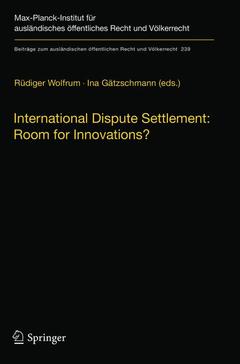Description
International Dispute Settlement: Room for Innovations?, 2013
Beiträge zum ausländischen öffentlichen Recht und Völkerrecht Series, Vol. 239
Language: English
Subject for International Dispute Settlement: Room for Innovations?:
Publication date: 01-2015
Support: Print on demand
Publication date: 01-2013
450 p. · 15.5x23.5 cm · Hardback
Description
/li>Contents
/li>Comment
/li>
This publication succeeds previously published seminars of the Max Planck Institute for Comparative Public Law and International Law (Heidelberg, Germany) dealing with evolving principles and new developments in international law. Due to the limits of traditional dispute settlement in international law and the ongoing scholarly debate on those limits, it focuses on possible innovations and functional approaches to improve international dispute settlement mechanisms. In doing so, it covers a wide variety of topics such as procedures of the WTO, advisory opinions of international courts and tribunals, the privatization of international dispute settlement, the interaction between counsels and international courts and tribunals, and the law-making function of international courts. The aim of this publication is to contribute to the cross-fertilization between these mechanisms and to offer creative impulses for the promotion of international dispute settlement.




